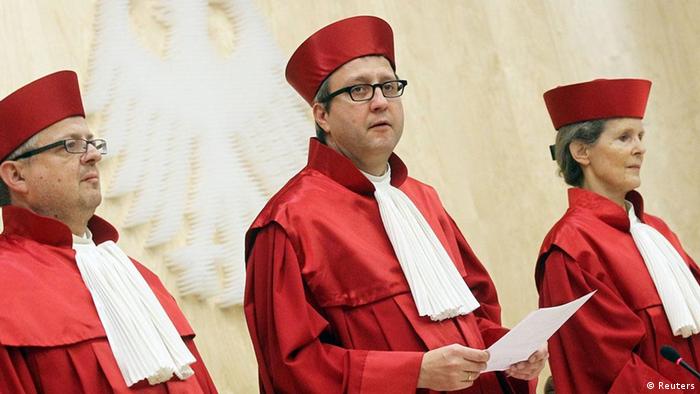Germany's Constitutional Court has declared that parliament must participate more actively in emergency decisions on eurozone aid, rejecting measures to turn over these powers to a select body of representatives.
Germany's highest court ruled on Tuesday that a select body of nine parliamentarians charged with making emergency decisions on eurozone bailouts had to be expanded in order to properly respect the "budgetary responsibility of parliament."
The German lower house of parliament, the Bundestag, had passed a law that empowered a nine-member body to make rapid decisions on behalf of the 620-member legislature during emergency economic situations involving the health of the euro, the common currency of 17 European Union member states.
The nine-member body is chosen from the 41-member budget committee. All parties in parliament are represented by the nine members, with the governing coalition in the majority. The body would vote on decisions regarding the temporary European bailout fund, the European Financial Stability Facility (EFSF), which is designed to halt the spread of the sovereign debt crisis.
Two parliamentarians from the center-left Social Democrats, Peter Danckert and Swen Schulz, originally filed the case with the Constitutional Court, arguing that the right of parliament to decide over budgetary issues was infringed by the nine-member body. In October 2011, the Constitutional Court had suspended the body from carrying out its work pending review of its constitutionality.
The court's president, Andreas Voßkuhle, said in Tuesday's ruling that democratic rules should not be left by the wayside if it's not absolutely necessary.
"Otherwise we run the danger of damaging the overall functionality of parliament," Voßkuhle said.
Parliamentary rights
Chancellor Angela Merkel's center-right coalition government does not see its ability to take action in the eurozone debt crisis negatively impacted by the court's decision, said Steffen Kampeter, the state secretary for finance. Kampeter said that the court had confirmed the government's position that the nine-member body can make decisions on the purchase of government bonds.
Bundestag President Norbert Lammert, a member of Merkel's center-right Christian Democrats, said that Tuesday's ruling underlined the rights and responsibilities of the Bundestag. Lammert said parliament would work to adjust the law to meet the court's concerns.
Thomas Oppermann, a high-ranking official with the center-left Social Democrats, said the decision created more transparency in the decision-making process by involving the parliament more broadly.
"[The court] strengthened the overall budgetary responsibility of parliament, reducing the responsibility of the nine-member body to an absolute minimum," Oppermann said. "That will make the euro bailout measures more transparent and comprehensible for people."
Otto Fricke, a budgetary expert with the market-friendly Free Democrats (FDP), said that the court "recognized the body as constitutional in principle," adding that the FDP would work to implement the points that the court had laid out in its ruling.
slk/acb (AFP, Reuters, dapd) dw.de

Comments